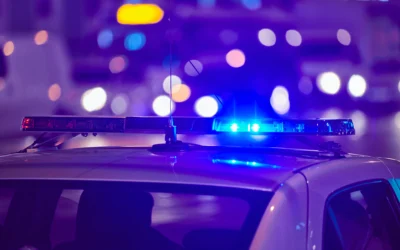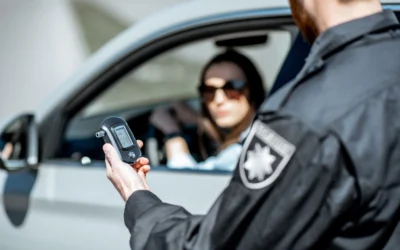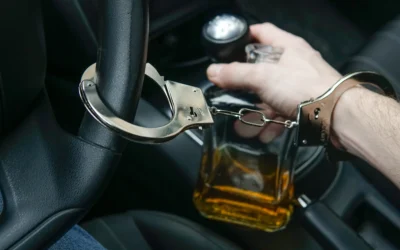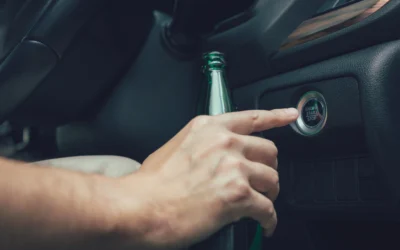The Moment Blue Lights Appear in Your Rearview Mirror
Your heart sinks. Time slows down. The flashing blue lights in your rearview mirror signal a moment that could change your life forever. Whether you’ve had one drink with dinner or made a serious lapse in judgment, a DUI stop in Nevada carries consequences that can impact your future for years to come.
At Joey Gilbert & Associates, we’ve seen firsthand how a DUI charge can turn a normal life upside down. But we’ve also witnessed how proper information, quick action, and skilled representation can make all the difference in these cases.
Nevada enforces some of the toughest DUI laws in the nation, and staying informed about these laws is crucial for every driver in the Silver State. This guide walks you through what you need to know about Nevada’s DUI laws in 2025, including recent changes that might affect your case.
Understanding Nevada DUI Laws
What Constitutes a DUI in Nevada?
Under Nevada Revised Statutes (NRS) 484C.110, you can be charged with driving under the influence (DUI) in Nevada if:
- You drive or are in “actual physical control” of a vehicle with a blood alcohol concentration (BAC) of 0.08% or higher within two hours of driving (a “per se” DUI)
- You drive while under the influence of alcohol to a degree that renders you incapable of safely driving or exercising control of a vehicle
- You drive with prohibited amounts of controlled substances in your blood or urine
- You drive while under the influence of controlled substances or a combination of alcohol and drugs that renders you incapable of safely driving
It’s worth noting that you can be charged with DUI even if your vehicle isn’t moving. Under Nevada law, “actual physical control” means you could potentially operate the vehicle, such as sitting in the driver’s seat with the keys accessible, even if the engine isn’t running.
Legal BAC Limits in Nevada
The legal BAC limits in Nevada vary depending on the type of driver:
- Standard drivers: 0.08% or higher
- Commercial drivers: 0.04% or higher
- Drivers under 21: 0.02% or higher
“Per Se” DUI vs. Impairment DUI
Nevada recognizes two types of DUI offenses:
- “Per se” DUI – This means your BAC tested at or above the legal limit, regardless of whether you showed signs of impairment. If your BAC is at or above the limit, the law presumes you’re too intoxicated to drive safely.
- Impairment DUI – This means you were driving while impaired by alcohol or drugs, regardless of your BAC level. Even if your BAC is below the legal limit, you can still be charged if the officer believes your driving ability was impaired.
What “Actual Physical Control” Means
You don’t need to be driving to be charged with DUI in Nevada. Being in “actual physical control” of a vehicle while under the influence is sufficient for a DUI charge. This includes:
- Sitting in the driver’s seat with keys in the ignition
- Sleeping in your car with the engine running
- Sitting in a parked vehicle with the ability to drive
However, Nevada law does provide a “sleeping it off” defense. Under NRS 484C.110, you’re not considered in actual physical control if:
- You’re asleep in the vehicle
- The vehicle isn’t running
- You’re not in the driver’s seat
- The vehicle couldn’t have been driven to where it was found while you were under the influence
Nevada’s Implied Consent Law
By driving on Nevada roads, you automatically consent to chemical testing (breath, blood, or urine) if lawfully arrested for DUI. This is known as “implied consent” under NRS 484C.160.
If you refuse testing:
- The officer can use reasonable force to obtain a sample
- You may be arrested immediately
- Your driver’s license will be automatically revoked for one year
- The refusal can be used against you in court
Recent Changes to Nevada DUI Laws (2025)
Nevada has implemented several significant changes to its DUI laws in 2025:
Technology-Based Enforcement
- DUI checkpoints now incorporate real-time license plate scanning technology to identify drivers with prior DUI convictions or outstanding warrants
- Law enforcement has deployed new roadside testing devices that can detect substances like THC, opioids, and stimulants
- Mobile breathalyzer units and real-time BAC tracking have been implemented statewide
Ignition Interlock Device Requirements
- Offenders now bear the full cost of IID installation and monitoring
- IIDs are now mandatory for all DUI convictions, not just those with high BAC levels
Enhanced Officer Training
With the legalization of cannabis and the rise in prescription medication use, Nevada has implemented enhanced training for officers to detect drug-impaired driving, including:
- Advanced field sobriety test procedures specific to drug impairment
- Training to recognize signs of impairment from various substances
- Certification in drug recognition evaluation (DRE)
Diversion Program Expansions
Courts now offer more comprehensive diversion programs for first-time offenders, focusing on education and rehabilitation rather than punishment. Successful completion can lead to reduced penalties or even case dismissal.
Pending Legislation
Senate Bill 309, currently under consideration, would:
- Expand the list of prohibited substances for DUI charges. Fentanyl and methamphetamine are to be added to the list of prohibited substances for DUI offenses
- Lower the BAC threshold from 0.18% to 0.16% for mandatory substance abuse evaluations
- Increase maximum fines for misdemeanor DUIs from $1,000 to $3,000
- Increase maximum fines for gross misdemeanor DUIs from $2,000 to $4,000
- Address the admissibility of blood tests in DUI cases
- Stricter penalties are proposed for DUI offenses involving minors under the age of 15.
DUI Penalties in Nevada
Nevada uses a seven-year “lookback period” when determining if a DUI is a first, second, or subsequent offense. Penalties increase significantly with each offense within that timeframe.
First Offense DUI
A first DUI within seven years is a misdemeanor and typically carries:
- 2 days to 6 months in jail, or 48 to 96 hours of community service
- Fines between $400 and $1,000, plus court costs
- DUI School (an alcohol awareness program)
- Victim Impact Panel attendance
- Driver’s license revocation for 185 days
- Possible installation of an ignition interlock device (IID), mandatory if BAC was 0.18% or higher
For first offenders with a BAC of 0.18% or higher, additional penalties include:
- Mandatory substance abuse evaluation ($100)
- Potential required attendance in a substance abuse treatment program
- Mandatory IID installation for 12-36 months
Second Offense DUI
A second DUI within seven years is still a misdemeanor but carries harsher penalties:
- 10 days to 6 months in jail or house arrest
- Fines between $750 and $1,000, plus court costs
- Driver’s license revocation for 1 year
- Mandatory attendance in a substance abuse treatment program
- Victim Impact Panel attendance
- Mandatory IID installation for 12-36 months
Third and Subsequent Offenses
A third DUI within seven years is a category B felony and carries:
- 1 to 6 years in Nevada State Prison
- Fines between $2,000 and $5,000
- Driver’s license revocation for 3 years
- Mandatory IID installation for 12-36 months after release
If you’ve previously been convicted of a felony DUI, any subsequent DUI can be charged as a felony regardless of when it occurred.
DUI Causing Injury or Death
If your DUI causes substantial bodily harm or death to another person, you’ll face category B felony charges with:
- 2 to 20 years in prison
- Fines between $2,000 and $5,000
- Driver’s license revocation for 3 years
In cases resulting in death with three prior DUI offenses, you may face vehicular homicide charges (category A felony) with a minimum of 10 years in prison.
Underage DUI
For drivers under 21:
- BAC of 0.02% to 0.08%: 90-day license suspension (administrative penalty)
- BAC of 0.08% or higher: Same penalties as adult DUI offenders
- Mandatory substance abuse evaluation regardless of BAC level
Commercial Driver DUI
For commercial drivers:
- BAC of 0.04% or higher: DUI charge
- Driver disqualified from operating commercial vehicles for at least 1 year (3 years if transporting hazardous materials)
- Second offense: Lifetime disqualification from operating commercial vehicles
License Revocation and DMV Hearings
Administrative vs. Criminal Penalties
A Nevada DUI involves two separate processes:
- Criminal case: Handled by the courts and determines guilt and criminal penalties
- Administrative case: Handled by the DMV and determines license revocation
These processes operate independently, meaning you could win your criminal case but still lose your license through the administrative process.
Process for License Revocation
When arrested for DUI:
- If you fail a breath test, the officer immediately takes your license and issues a temporary license valid for 7 days
- If you take a blood test, you keep your license until the DMV mails a notice of revocation along with a 7-day temporary license once results show illegal BAC levels
How to Request a DMV Hearing
You have only 7 days from receiving notice of revocation to request a DMV hearing to contest your license revocation. The request must be:
- In writing
- Sent to the DMV office listed on your notice
- Include your full name, date of birth, driver’s license number, current address, and case number if available
Temporary License Options
While awaiting your DMV hearing, you can apply for a temporary driver’s license by:
- Requesting it when you request your DMV hearing
- Proving you need to drive for work, school, medical treatment, or essential household duties
- Providing proof of Nevada SR-22 insurance
IID Restricted License Option
You may be eligible to continue driving with an ignition interlock device (IID) installed in your vehicle. This requires:
- Completing any required suspension period
- Installing an approved IID at your own expense
- Providing proof of Nevada SR-22 insurance
- Paying a license reinstatement fee
DUI Cases Involving Drugs
Marijuana DUI Laws in Nevada
While recreational marijuana is legal in Nevada, driving under its influence is not. As of 2021, Nevada removed per se limits for marijuana metabolites, which means:
- Officers must now prove actual impairment for marijuana DUI cases
- The presence of THC alone is not sufficient for conviction
- Officers now rely on field sobriety tests and observations of impairment
However, Senate Bill 309 proposes reinstating specific limits for marijuana and its metabolites.
Prescription Medication Considerations
Nevada law clearly states that having a valid prescription is NOT a defense to DUI charges. You can be charged with DUI if your legally prescribed medication impairs your driving ability.
Testing Procedures for Drug DUIs
Drug detection involves:
- Field sobriety tests
- Blood or urine tests
- Evaluation by a Drug Recognition Expert (DRE)
Unlike alcohol, which can be detected with roadside breath tests, drug testing typically requires blood or urine analysis, which takes longer to process.
Combinations of Alcohol and Drugs
Combining alcohol with drugs (legal or illegal) often produces enhanced impairment. Even if both substances are below their individual legal limits, the combination can lead to DUI charges if it impairs your driving ability.
Possible Defenses to DUI Charges
Rising Blood Alcohol Defense
Your BAC continues to rise for a period after you stop drinking. The “rising blood alcohol” defense argues that your BAC was below the legal limit while driving but rose above it by the time of testing.
Challenging the Traffic Stop
Police must have reasonable suspicion to pull you over. If the stop was illegal, evidence obtained afterward may be inadmissible.
Issues with Testing Procedures
Defenses related to testing may include:
- Improper calibration of breath testing devices
- Improper administration of field sobriety tests
- Chain of custody issues with blood samples
- Failure to follow proper testing protocols
Medical Conditions Affecting Results
Certain medical conditions can affect test results:
- Acid reflux or GERD can cause falsely high breath test results
- Diabetes can produce ketones that some breath tests mistake for alcohol
- Certain diets (like keto) can affect breath alcohol readings
“Sleeping It Off” Defense
As mentioned earlier, Nevada law provides a defense if you were attempting to “sleep it off” rather than drive while intoxicated, provided you meet the specific criteria in NRS 484C.110.
DUI Court and Rehabilitation Programs
Misdemeanor DUI Court
First or second-time DUI offenders suffering from addiction may be eligible for Misdemeanor DUI Court, which includes:
- Intensive supervision
- Regular court appearances
- Mandatory treatment
- Random testing
- Completion can result in reduced charges or penalties
Felony DUI Court
Third-time DUI offenders may avoid prison through Felony DUI Court, which typically requires:
- At least 3 years of participation
- 6 months of residential confinement
- Electronic monitoring
- IID installation
- Regular drug/alcohol testing
Treatment Options
Treatment programs may include:
- Inpatient or outpatient rehabilitation
- Counseling
- 12-step programs
- Medication-assisted treatment
- Regular monitoring
How These Programs Can Reduce Penalties
Successful completion of DUI Court programs can result in:
- Reduced jail/prison time
- Reduced fines
- Earlier license reinstatement
- Treatment instead of incarceration
- Reduced charge (in some cases)
Key Takeaways
- DUI laws in Nevada are strict and carry severe consequences, including jail time, hefty fines, and license revocation.
- Nevada recognizes both “per se” DUIs (based on BAC limits) and impairment DUIs (based on observable signs of impairment).
- The seven-year lookback period means prior DUI convictions significantly increase penalties for new offenses.
- You have only 7 days to request a DMV hearing after receiving notice of license revocation.
- Recent changes to Nevada DUI laws include enhanced technology for enforcement, expanded use of ignition interlock devices, and improved detection of drug-impaired driving.
- You can be charged with DUI for prescription medications, marijuana, or other substances if they impair your driving ability.
- First-time offenders may be eligible for diversion programs that focus on rehabilitation rather than punishment.
- Having a valid defense strategy is crucial – from challenging the traffic stop to questioning testing procedures.
- Acting quickly after a DUI arrest is essential to protect your rights and driving privileges.
- Professional legal representation can significantly improve your chances of a favorable outcome.
Frequently Asked Questions
Can I refuse a breathalyzer test in Nevada?
Yes, but refusing has serious consequences. Under Nevada’s implied consent law, refusal will result in automatic license revocation for one year, and the officer can obtain a warrant for a blood test.
How long will a DUI stay on my record in Nevada?
A misdemeanor DUI conviction remains on your criminal record for 7 years before you can petition for a record seal. Felony DUI convictions cannot be sealed and remain on your record permanently.
Can I still drive to work after a DUI?
Possibly. You may be eligible for a restricted license that allows driving to and from work, school, medical appointments, and other essential activities. This typically requires installing an ignition interlock device.
What happens if I get a DUI in Nevada but live in another state?
Nevada will report your DUI to your home state, which will likely impose its own penalties. Under the Interstate Driver’s License Compact, most states honor each other’s license suspensions.
Is a DUI a felony in Nevada?
First and second DUI offenses within seven years are typically misdemeanors. A third offense within seven years, any DUI causing injury or death, or any DUI after a previous felony DUI conviction is a felony.
How much does a DUI cost in Nevada?
Beyond legal penalties, the total cost of a DUI can exceed $10,000 when accounting for:
- Fines and court costs
- Attorney fees
- Increased insurance premiums
- IID installation and maintenance
- DUI school and treatment programs
- License reinstatement fees
- Lost wages from court appearances
Can I plead to a lesser charge like reckless driving?
Possibly, but Nevada law restricts prosecutors from reducing DUI charges unless they believe the evidence is insufficient to support a conviction. An experienced DUI attorney can help determine if this option is available in your case.
Contact Joey Gilbert & Associates
If you or someone you care about is facing DUI charges in Nevada, time is of the essence. The attorneys at Joey Gilbert & Associates have the knowledge, skills, and dedication to fight for the best possible outcome in your case.
Our firm offers:
- Free initial consultations to discuss your case
- Aggressive defense strategies tailored to your specific situation
- Extensive knowledge of Nevada DUI laws and recent changes
- Experience with both the criminal and administrative aspects of DUI cases
- Personalized attention and regular case updates
- Assistance with license issues, court hearings, and treatment programs
Don’t face DUI charges alone. Schedule a free consultation with our Nevada DUI attorney today to protect your rights, your license, and your future.



